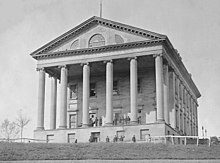William Henry Brodnax
William Henry Brodnax | |
|---|---|
| Born | 1786 |
| Died | October 23, 1834 (aged 53) |
| Alma mater | Hampden-Sydney College |
| Occupation(s) | Soldier, Legislator |
| Title | Brigadier General, Delegate |
William Henry Brodnax (also Broadnax), (1786 – October 23, 1834) was a nineteenth-century American militia Brigadier General and American politician from Virginia.[1][2]
Early life[edit]
Born in Brunswick County, Virginia, Broadnax graduated from Hampden-Sydney College having studied law, and later received an honorary Master of Arts degree from there in 1830 at age forty-four following his service as a delegate to the Virginia Constitutional Convention of 1829-1830.[2]
Career[edit]

where 19th century Conventions met
Brodnax began practicing the Law in Petersburg, Virginia.
Brodnax twice served as a member of the Virginia House of Delegates, once from 1818 to 1819 and again from 1830–1833.[3] He was also a member of the American Colonization Society.[2]
Over the course of a military career in the Virginia militia, Brodnax attained the rank of Brigadier General. In 1824, he was appointed by the Virginia state legislature to meet General Lafayette on his arrival at Baltimore, Maryland. He served as the chief marshal at Yorktown, Virginia, when Lafayette visited.[2]
Early on in his political career, Brodnax was a member of the Whig Party. Broadnax was a presidential elector in 1825. He served as a delegate in the Virginia Constitutional Convention of 1829-1830 as one of four delegates from the state senatorial district including his home county of Dinwiddie, Brunswick, Lunenburg and Mecklenburg.[2]
In August 1831, Brodnax served as commanding general of the Virginia militia during the Nat Turner's Rebellion in Southampton County, Virginia. The next month he represented, along with his brother Meriwether Brodnax, several slaves accused of participating in Nat Turner's Rebellion in Sussex.[4] Neither of those assertions are supported by the Southampton County, Virginia, court minutes. Brodnax is not mentioned in those records, and his brother Meriwether B. Brodnax (sometimes written Merewether B. Broadnax) was a prosecutor, not a defense counsel. (Meriwether was listed was defense counsel in Sussex County.) He was listed in Sussex County Court records. Gen. Eppes was in command of the troops in the area.[5][6] In 1832 during the Virginia legislature's debate about slavery Brodnax spoke in favor of colonization of free African Americans.[7]
Death[edit]
Brodnax died of cholera on October 23, 1834, and was buried in the cemetery at Dimwiddie County Courthouse.[3] His will was probated in Dinwiddie County in December 1834.[citation needed]
References[edit]
- ^ Freehling, William W. (1990). The Road to Disunion: Secessionists at Bay, 1776-1854:, Volume 1. Oxford University Press. pp. 184–186, 189, 191, 195, 204. ISBN 0195058143. Retrieved 10 August 2015.
- ^ a b c d e Pulliam 1901, p. 75
- ^ a b Goodyear Freehling, Allison. "William H. Brodnax (ca. 1786–1834)". Encyclopedia Virginia. Retrieved 10 August 2015.
- ^ Alfred L. Brophy, "The Nat Turner Trials", North Carolina Law Review (June 2013), volume 91: 1817-80.
- ^ [1] Southampton Co., VA, Court Minute Book 1830-1835, p. 94-95
- ^ [2] "Proceedings on the Southampton Insurrection, Aug-Nov 1831"
- ^ Speech of William Henry Brodnax, (of Dinwiddie) in the House of Delegates of Virginia: on the Policy of the State with Respect to its Colored Population. Delivered January 19, 1832 [3]
Bibliography[edit]
- Pulliam, David Loyd (1901). The Constitutional Conventions of Virginia from the foundation of the Commonwealth to the present time. John T. West, Richmond. ISBN 978-1-2879-2059-5.
